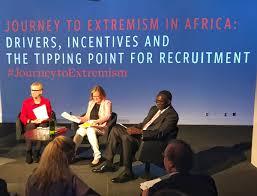
Journey To Extremism In Africa:
Drivers, incentives and the tipping point for recruitment
The Journey to Extremism in Africa: Drivers, Incentives and the Tipping Point for Recruitment presents the results of a two-year UNDP Africa study aimed to generate improved understanding about the incentives and drivers of violent extremism, as expressed by recruits to the continent’s deadliest groups themselves.
Press Release
Here a list of articles
http://journey-to-extremism.undp.org/en/media
“I am convinced that the creation of open, equitable, inclusive and pluralist societies, based on the full respect of human rights and with economic opportunities for all, represents the most tangible and meaningful alternative to violent extremism.”
– António Guterres, United Nations Secretary-General
From the press release: http://journey-to-extremism.undp.org/content/downloads/pr/MEDIA-RELEASE-...
The study calls on governments to reassess militarized responses to extremism in the light of respect for the rule of law and human rights commitments. Among the study’s key recommendations is intervention at the local level, including through support to community led initiatives aimed at social cohesion, and amplifying the voices of local religious leaders who advocate tolerance and cohesiveness.
Find here the findings: http://journey-to-extremism.undp.org/en/findings
What makes a person decide to join a violent extremist group?
The data points to a number of factors that can shape the journey
Find here the full report: http://journey-to-extremism.undp.org/content/downloads/UNDP-JourneyToExt...
Place of Birth
The majority of recruits come from borderlands or peripheral areas that have suffered generations of marginalization
Parental Involvement
Voluntary recruits tend to report less parental involvement in their lives as children
Education
16 16% of voluntary recruits have 2 or fewer years of education
39 39% have only 5 to 10 years of education
Religion
More than 1/2 of voluntary recruits cite religious reasons for joining an extremist group – yet 57 57% of respondents admit that they either don’t read or have little to no understanding of the religious texts or interpretations
Economic Conditions
55 55% of the voluntary recruits express moderate to severe frustration at their economic conditions
Employment is the most frequently cited need at the time of joining
83% of voluntary recruits believe that government looks after only the interests of a few
No confidence in police, military or politicians
Over 75 75% voluntary
recruits place no trust in
politicians or in the state
security apparatus










Add new comment